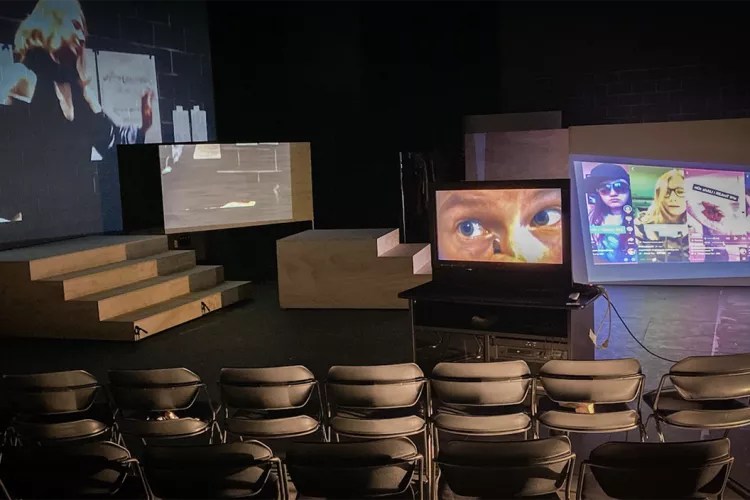College Production of ‘The Women of Trachis’ Plays for an Audience of None

The opening of Sophocles’s “The Women of Trachis” was put on with no cast, crew, director, ushers, or audience members present. Instead, a remotely controlled computer began a 32-minute projection containing students’ interpretations of the Greek tragedy.
The Washington Post: No one will ever see this play, and no actors are coming either. But the show will go on. (April 24, 2020)
No audience is being invited to Friday’s opening of Sophocles’s “The Women of Trachis” on the campus of Pennsylvania’s Swarthmore College. No actors will be on hand, either — or, for that matter, designers, technicians or box-office staff. Not even the director, Michał Zadara.
Yet the show will go on. A show that no one will ever see.
The performance is scheduled to begin promptly at 8 p.m. “No one will be admitted. No one will be onstage,” reads a news release for the production. “Don’t call for reservations. No live streaming.”
Inside the Frear Ensemble Theater, a black-box space in the Lang Performing Arts Center, a computer will be activated remotely. Over the next 32 minutes, projections created by Zadara and his cast will unspool, encapsulating the events of this rarely revived Greek tragedy. The projections contain the student actors’ interpretations of characters and plot, scene by scene, recorded recently on TikTok and iMovie, where each student is sheltering in place: Minnesota, Pennsylvania, Russia. The effort has resulted in what might be deemed an ethereal new genre for a surreal new era.
Ghost theater.
---
Lest you consign this anti-event to the category of clever stunt, consider the rigor that has gone into its development. The adaptation of “The Women of Trachis,” the tale of a wife’s revenge against an unfaithful Herakles, was meant to be a traditional live performance. It was scrupulously researched, dissected and debated by Zadara’s Greek tragedy class, with the production as the second semester’s capstone.
With the guidance of dramaturge Nathaniel Ziv Stern ’20, an honors linguistics major from New York who has studied ancient Greek, the class spent the early part of the semester discussing the meanings of the play and its characters’ roles, and created an original text based on their interpretation. Swarthmore’s Classics Department chair and Honors Program director, Grace Ledbetter, also advised them, and a biology major in the class, Sophie Nasrallah ’20, from Lutherville-Timonium, Md., was to be the stage manager.
Then, at spring break, the advance of COVID-19 canceled everything, including the rest of the school year. With only extremely limited access to the campus allowed, Zadara was granted careful use of the Frear. As long as it remained, well, off-limits.
---
Theater is a most ephemeral form: What happened in a performance space yesterday is gone today. But did one have to be there to feel its impact? “That’s the tragedy,” Stern said. “You have this thing that is beautiful that you can only gesture at, but no one can reach.”
Knowing that people might learn of their efforts became as vital to the participants as performing the work themselves. Anyone who has ever been in or worked backstage on a play — whether a middle school musical or a Broadway epic — is aware of the exhilarating bond. When the project ends, it’s a letdown. You’d become a unit, allied in purpose, dependent on one another, unified in its execution. This group was denied that catharsis, so it had to find another one.



